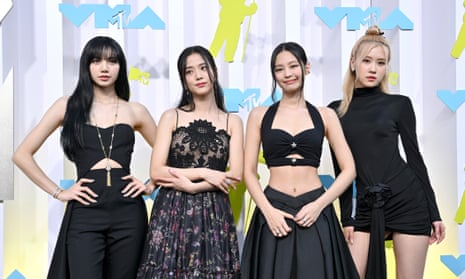Although they thrived in the 90s and 00s, girl groups have had less impact on western pop over the past decade. With the exception of Little Mix, who recently went on hiatus, the charts in the 2010s and beyond have largely been the story of solo superstars such as Beyoncé and Adele. South Korean four-piece Blackpink are looking to change that: when their album Born Pink drops on Friday, it will fortify their status as the biggest girl group on the planet and, along with K-pop compatriots BTS, one of the biggest groups in the world.
Tying EDM beats with influences from hip-hop, Blackpink’s music is harsher and far more maximalist than a lot of the music that fills the western charts. Their music videos look like dystopian fashion editorials and their choreography seems crafted with viral dance trends in mind. Many of their hits begin with the same opening line: “Blackpink in your area” – the lyric serving as both calling card and warning shot, and signalling the group’s desire for global success.
Comprising two rappers, Jennie (full name Jennie Kim) and Lisa (Lalisa Manobal), and two singers, Rosé (Roseanne Park) and Jisoo (Kim Ji-soo), Blackpink debuted in 2016 with the single Whistle, which immediately went to the top of the Korean charts. The group’s followup, Boombayah, on which they threaten to give “all the guys nosebleeds”, topped Billboard’s World Digital Song Sales chart. It was a rapid rise to fame, even for a group managed by YG Entertainment, the major Korean entertainment conglomerate that launched Psy’s Gangnam Style. Those singles were the first in a series of K-pop milestones: in 2019 Blackpink became the first K-pop act to perform at Coachella, and in 2021 they overtook Justin Bieber as the artists with the most YouTube subscribers – some 75 million.
The first single taken from Born Pink, Pink Venom, had 90.4m video views in 24 hours last month, and seems to nod to the band’s juggernaut status. In the opening bars, Jennie references the Notorious BIG and flexes her status as a brand ambassador for Chanel, while Lisa interpolates Rihanna’s 2005 debut hit Pon de Replay. A typically eye-popping music video shows Jisoo, wearing traditional hanbok, playing a Korean zither while New Zealand-born Rosé faces down a wind machine and wields an electric guitar.
Like the Spice Girls before them, Blackpink’s members have disparate identities by design. Jennie, Lisa and Rosé have all released solo music in the past few years; all four members have lucrative brand sponsorships with different luxury fashion houses and are regularly seen at fashion week events. This focus on individual activities has made full Blackpink releases more rare, to the dissatisfaction of some fans. But the focus on making a mark on western culture, as opposed to catering to existing fans, is savvy. While Blackpink’s star continues to rise in the west, in Korea there are already new contenders: Pink Venom was beaten in the charts by the debut single from girl group NewJeans.
“Blackpink are somewhat notorious for having what feels like more brand deals than songs,” says culture journalist Iana Murray. But this strategy has resulted in a saturation that’s uncommon for K-pop stars in the west – with the exception of megastar boyband BTS – and has made Blackpink in-demand collaborators. The group featured on Lady Gaga’s Chromatica single Sour Candy while their own songs have featured Selena Gomez and Cardi B. In 2018, Dua Lipa recruited the band for Kiss and Make Up, which became a top 40 single in the UK, Australia and Canada.
Grammy-nominated songwriter Chelcee Grimes, who co-wrote the track, says that Blackpink are unique for their ability to move between western and Asian pop markets: “They were willing to step out of a place they’ve always been a success and try different styles of music,” she says. “Kiss and Make Up didn’t have anything K-Pop about it, and I was like: ‘OK, these girls want to bend the rules a bit. I’m into it.’”
It’s common for K-pop idols to make forays into acting but Blackpink are doing that differently, too: later this year, Jennie is set to appear in The Idol, a new HBO show about a pop star who falls in love with a cult leader, produced by the Weeknd and Euphoria’s Sam Levinson. “Jennie’s role is vastly different from what idols-turned-actors usually take on,” says Murray. “Not only because it’s an American series but because of how provocative it appears to be.”
Unconventional moves like this could be by design: a typical K-pop contract lasts seven years, which would put Blackpink’s relationship with YG on the table in 2023. With other K-pop groups on the rise and the west fast becoming a big market for the band, it makes sense that they would want to break the mould. Still, the group have longevity in mind. This year’s Born Pink world tour begins in Seoul before going to North America, Europe, Asia and Oceania, and their appetite for performance seems undiminished. In a recent interview with Rolling Stone, Lisa telegraphed sky-high ambition: “I see the Spice Girls, how they got together for a reunion concert. Can we do that too, someday?”

Comments (…)
Sign in or create your Guardian account to join the discussion